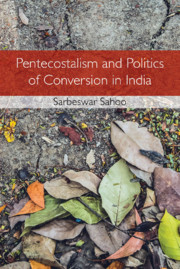Book contents
- Frontmatter
- Contents
- Foreword
- Preface
- Abbreviations
- 1 Introduction: Conversion and the Shifting Discourse of Violence
- 2 Spreading Like Fire: The Growth of Pentecostalism among Tribals
- 3 Taking Refuge in Christ: Four Narratives on Religious Conversion
- 4 Becoming Believers: Adivasi Women and the Pentecostal Church
- 5 Seen as the Alien: Hindutva Politics and Anti-Christian Violence
- 6 Conclusion: Beyond the Competing Projects of Conversion
- Endnotes
- Bibliography
- Index
5 - Seen as the Alien: Hindutva Politics and Anti-Christian Violence
Published online by Cambridge University Press: 05 April 2018
- Frontmatter
- Contents
- Foreword
- Preface
- Abbreviations
- 1 Introduction: Conversion and the Shifting Discourse of Violence
- 2 Spreading Like Fire: The Growth of Pentecostalism among Tribals
- 3 Taking Refuge in Christ: Four Narratives on Religious Conversion
- 4 Becoming Believers: Adivasi Women and the Pentecostal Church
- 5 Seen as the Alien: Hindutva Politics and Anti-Christian Violence
- 6 Conclusion: Beyond the Competing Projects of Conversion
- Endnotes
- Bibliography
- Index
Summary
On 23 December 2007, when the Hindu nationalist BJP was celebrating the electoral victory of Narendra Modi in Gujarat, a group of 150–200 militant Hindutva activists in the Kandhamal district of Odisha pulled out a pastor from a bus. He was beaten, tonsured and paraded naked. The next day a mob of about 3,000 people, armed with tridents, axes, crude bombs and kerosene attacked the Church of our Lady of Lourdes, burnt the altar and destroyed the Christmas decorations. Within the next 72 hours, across the tribal-dominated Kandhamal district, five parish churches, 48 village churches, five convents, seven hostels and several church-run institutions bore the brunt of a Hindutva onslaught (Anand, 2008; Kanungo, 2008: 16–19). Not just in Odisha, but also in different parts of India incidents of such violence against religious minorities, especially Christians and Muslims, have increased since the 1990s. Another recent and horrific example is the Gujarat riots of 2002 where more than 2,000 Muslims were killed and 150,000 were left homeless (Sabrang Communications and SACW, 2002; Ghassem- Fachandi, 2012: 1).
Although the recent phase of violence against religious minorities is in some way unique, religious conflict in general is not new to India. According to scholars of secular nationalist historiography, British colonial rule, especially its ‘divide and rule’ policy, was responsible for Hindu–Muslim conflict and the breakdown of communal harmony in India. For example, Ashutosh Varshney (2002) and Suranjan Das (1990) have argued that communalism was constructed and promoted by the British to secure allies. They raised Muslim communalism as a counterweight to the emerging Indian nationalism. Mushirul Hasan (1980: 1395) has similarly noted that the roots of communalism in India lie in the Morley-Minto Reforms of 1909 which, by creating communal electorates, exacerbated Hindu–Muslim divisions and fostered the spirit of political exclusivism. This was further exacerbated by the Montagu-Chelmsford Reforms of 1919, which not just retained separate electorates for religious minorities but also suggested the devolution of power to Indian hands that led to a struggle for power and patronage and widened communal divisions in Indian society (Hasan, 1980: 1395). In a way, the British colonial state was responsible for communal violence in India (Pandey, 1990; Baber, 2006).
- Type
- Chapter
- Information
- Pentecostalism and Politics of Conversion in India , pp. 120 - 157Publisher: Cambridge University PressPrint publication year: 2018



